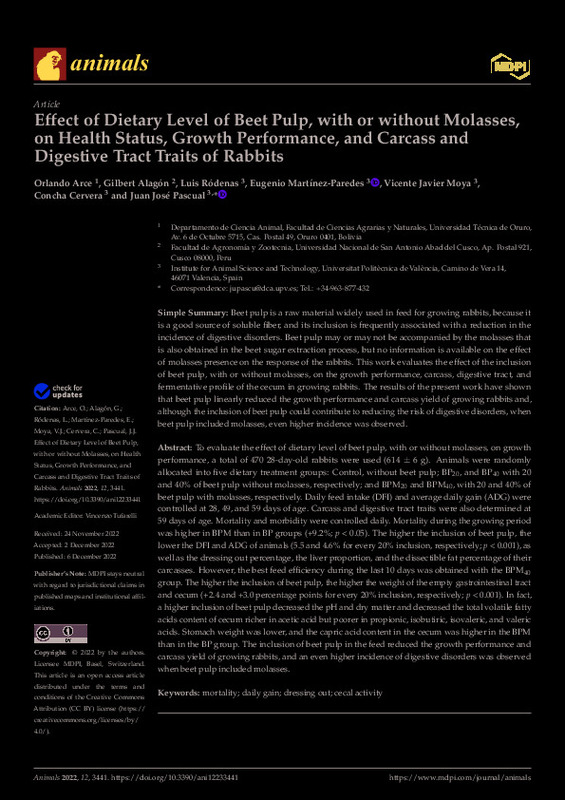JavaScript is disabled for your browser. Some features of this site may not work without it.
Buscar en RiuNet
Listar
Mi cuenta
Estadísticas
Ayuda RiuNet
Admin. UPV
Effect of Dietary Level of Beet Pulp, with or without Molasses, on Health Status, Growth Performance, and Carcass and Digestive Tract Traits of Rabbits
Mostrar el registro sencillo del ítem
Ficheros en el ítem
| dc.contributor.author | Arce, Orlando
|
es_ES |
| dc.contributor.author | Alagón, Gilbert
|
es_ES |
| dc.contributor.author | Ródenas Martínez, Luis
|
es_ES |
| dc.contributor.author | Martinez-Paredes, Eugenio
|
es_ES |
| dc.contributor.author | Moya, V.J.
|
es_ES |
| dc.contributor.author | Cervera, Concha
|
es_ES |
| dc.contributor.author | Pascual Amorós, Juan José
|
es_ES |
| dc.date.accessioned | 2023-05-23T18:02:05Z | |
| dc.date.available | 2023-05-23T18:02:05Z | |
| dc.date.issued | 2022-12 | es_ES |
| dc.identifier.uri | http://hdl.handle.net/10251/193548 | |
| dc.description.abstract | [EN] Beet pulp is a raw material widely used in feed for growing rabbits, because it is a good source of soluble fiber, and its inclusion is frequently associated with a reduction in the incidence of digestive disorders. Beet pulp may or may not be accompanied by the molasses that is also obtained in the beet sugar extraction process, but no information is available on the effect of molasses presence on the response of the rabbits. This work evaluates the effect of the inclusion of beet pulp, with or without molasses, on the growth performance, carcass, digestive tract, and fermentative profile of the cecum in growing rabbits. The results of the present work have shown that beet pulp linearly reduced the growth performance and carcass yield of growing rabbits and, although the inclusion of beet pulp could contribute to reducing the risk of digestive disorders, when beet pulp included molasses, even higher incidence was observed. To evaluate the effect of dietary level of beet pulp, with or without molasses, on growth performance, a total of 470 28-day-old rabbits were used (614 +/- 6 g). Animals were randomly allocated into five dietary treatment groups: Control, without beet pulp; BP20, and BP40 with 20 and 40% of beet pulp without molasses, respectively; and BPM20 and BPM40, with 20 and 40% of beet pulp with molasses, respectively. Daily feed intake (DFI) and average daily gain (ADG) were controlled at 28, 49, and 59 days of age. Carcass and digestive tract traits were also determined at 59 days of age. Mortality and morbidity were controlled daily. Mortality during the growing period was higher in BPM than in BP groups (+9.2%; p < 0.05). The higher the inclusion of beet pulp, the lower the DFI and ADG of animals (5.5 and 4.6% for every 20% inclusion, respectively; p < 0.001), as well as the dressing out percentage, the liver proportion, and the dissectible fat percentage of their carcasses. However, the best feed efficiency during the last 10 days was obtained with the BPM40 group. The higher the inclusion of beet pulp, the higher the weight of the empty gastrointestinal tract and cecum (+2.4 and +3.0 percentage points for every 20% inclusion, respectively; p < 0.001). In fact, a higher inclusion of beet pulp decreased the pH and dry matter and decreased the total volatile fatty acids content of cecum richer in acetic acid but poorer in propionic, isobutiric, isovaleric, and valeric acids. Stomach weight was lower, and the capric acid content in the cecum was higher in the BPM than in the BP group. The inclusion of beet pulp in the feed reduced the growth performance and carcass yield of growing rabbits, and an even higher incidence of digestive disorders was observed when beet pulp included molasses. | es_ES |
| dc.description.sponsorship | This research was funded by the Spanish Ministry of Education and Science (grant no. AGL2014-53405-C2-1-P). | es_ES |
| dc.language | Inglés | es_ES |
| dc.publisher | MDPI AG | es_ES |
| dc.relation.ispartof | Animals | es_ES |
| dc.rights | Reconocimiento (by) | es_ES |
| dc.subject | Mortality | es_ES |
| dc.subject | Daily gain | es_ES |
| dc.subject | Dressing out | es_ES |
| dc.subject | Cecal activity | es_ES |
| dc.subject.classification | PRODUCCION ANIMAL | es_ES |
| dc.title | Effect of Dietary Level of Beet Pulp, with or without Molasses, on Health Status, Growth Performance, and Carcass and Digestive Tract Traits of Rabbits | es_ES |
| dc.type | Artículo | es_ES |
| dc.identifier.doi | 10.3390/ani12233441 | es_ES |
| dc.relation.projectID | info:eu-repo/grantAgreement/MINECO//AGL2014-53405-C2-1-P/ES/MEJORA GENETICA DEL CONEJO DE CARNE:RESPUESTA A LA SELECCION Y SU EFECTO SOBRE LA REPRODUCCION, ALIMENTACION Y SALUD UTILIZANDO UNA POBLACION CONTROL CRIOCONSERVADA/ | es_ES |
| dc.rights.accessRights | Abierto | es_ES |
| dc.contributor.affiliation | Universitat Politècnica de València. Departamento de Ciencia Animal - Departament de Ciència Animal | es_ES |
| dc.contributor.affiliation | Universitat Politècnica de València. Escuela Técnica Superior de Ingeniería Agronómica y del Medio Natural - Escola Tècnica Superior d'Enginyeria Agronòmica i del Medi Natural | es_ES |
| dc.description.bibliographicCitation | Arce, O.; Alagón, G.; Ródenas Martínez, L.; Martinez-Paredes, E.; Moya, V.; Cervera, C.; Pascual Amorós, JJ. (2022). Effect of Dietary Level of Beet Pulp, with or without Molasses, on Health Status, Growth Performance, and Carcass and Digestive Tract Traits of Rabbits. Animals. 12(23):1-12. https://doi.org/10.3390/ani12233441 | es_ES |
| dc.description.accrualMethod | S | es_ES |
| dc.relation.publisherversion | https://doi.org/10.3390/ani12233441 | es_ES |
| dc.description.upvformatpinicio | 1 | es_ES |
| dc.description.upvformatpfin | 12 | es_ES |
| dc.type.version | info:eu-repo/semantics/publishedVersion | es_ES |
| dc.description.volume | 12 | es_ES |
| dc.description.issue | 23 | es_ES |
| dc.identifier.eissn | 2076-2615 | es_ES |
| dc.identifier.pmid | 36496961 | es_ES |
| dc.identifier.pmcid | PMC9736684 | es_ES |
| dc.relation.pasarela | S\484803 | es_ES |
| dc.contributor.funder | MINISTERIO DE ASUNTOS ECONOMICOS Y TRANSFORMACION DIGITAL | es_ES |
| dc.subject.ods | 12.- Garantizar las pautas de consumo y de producción sostenibles | es_ES |








